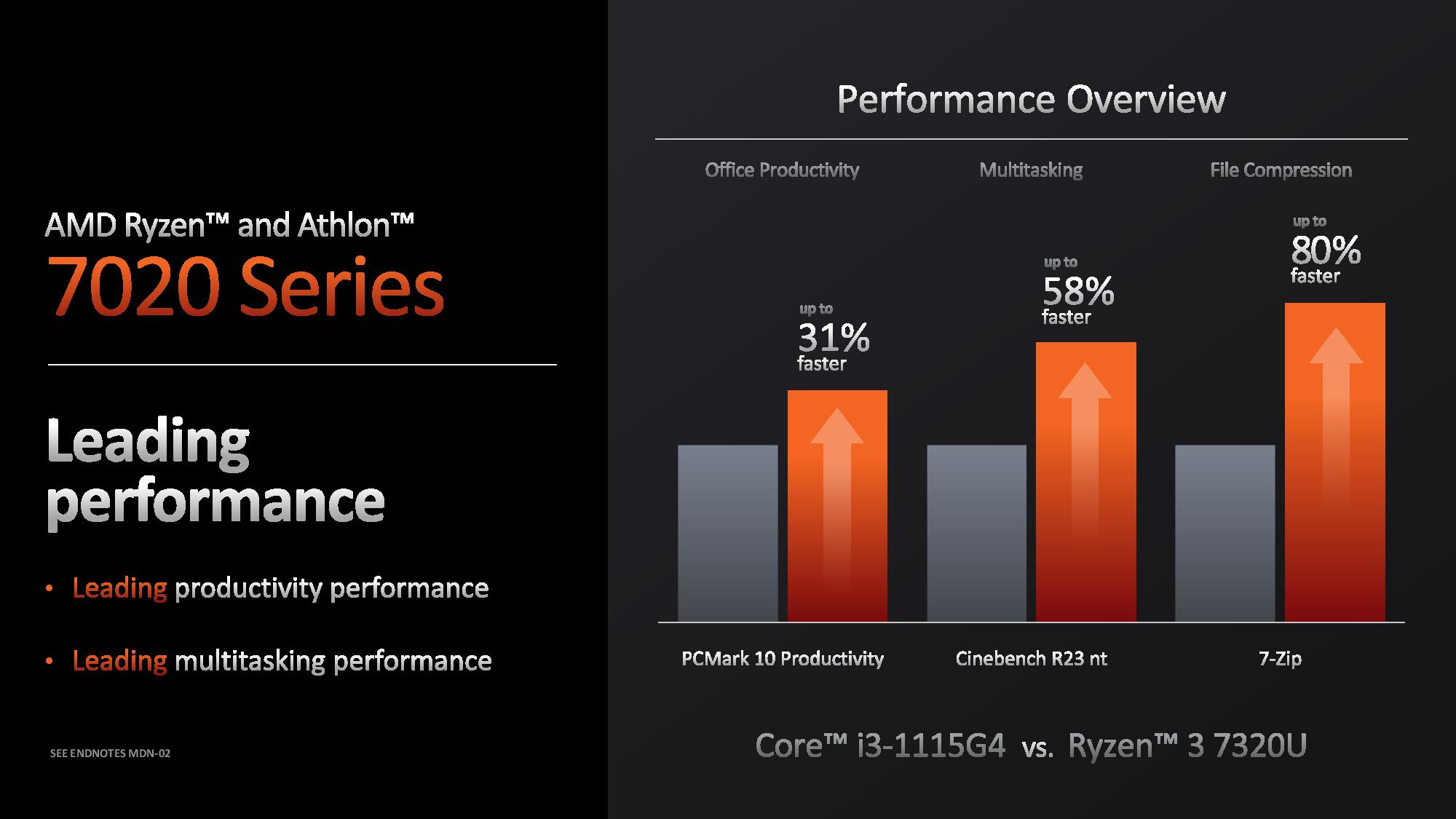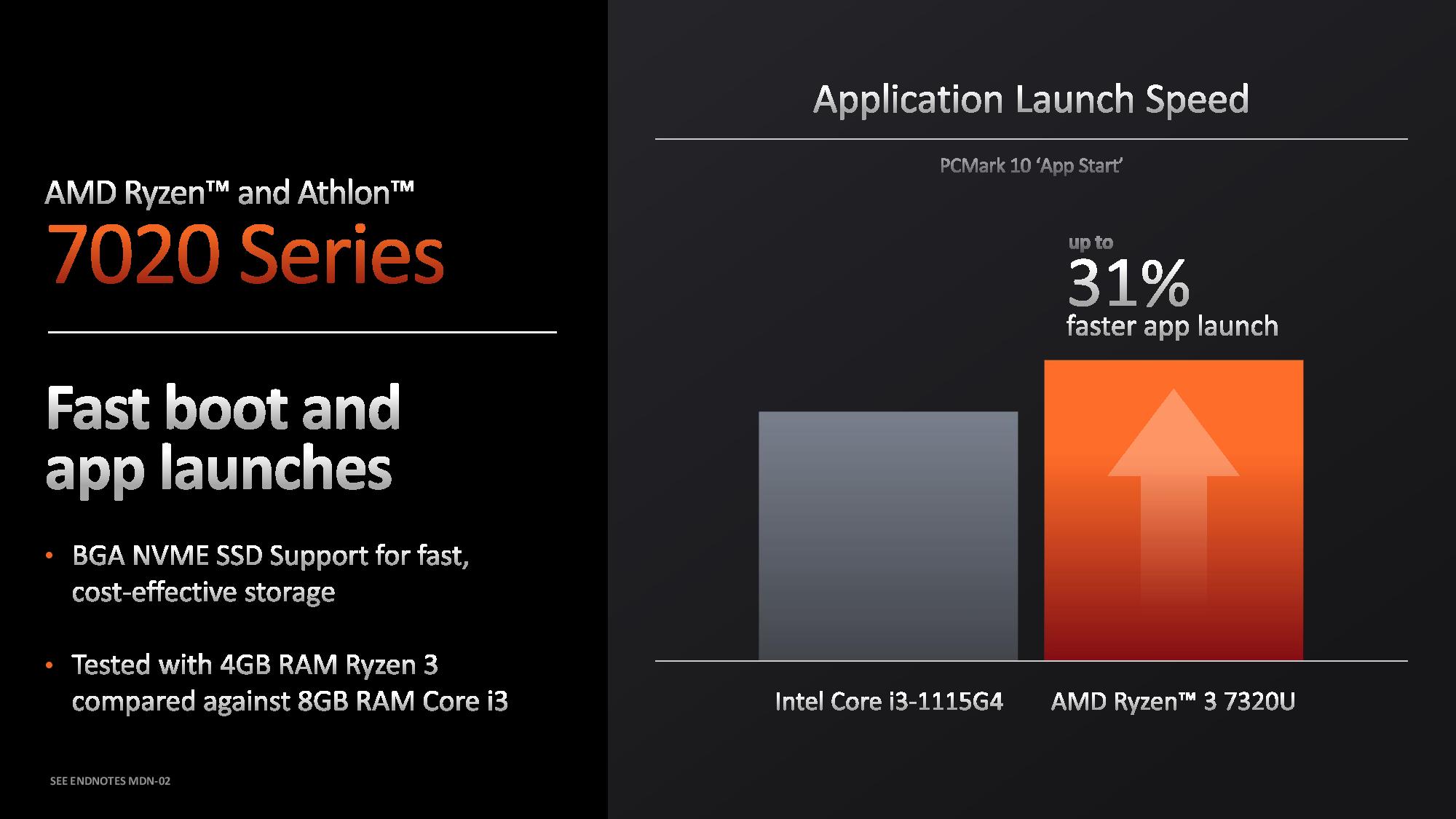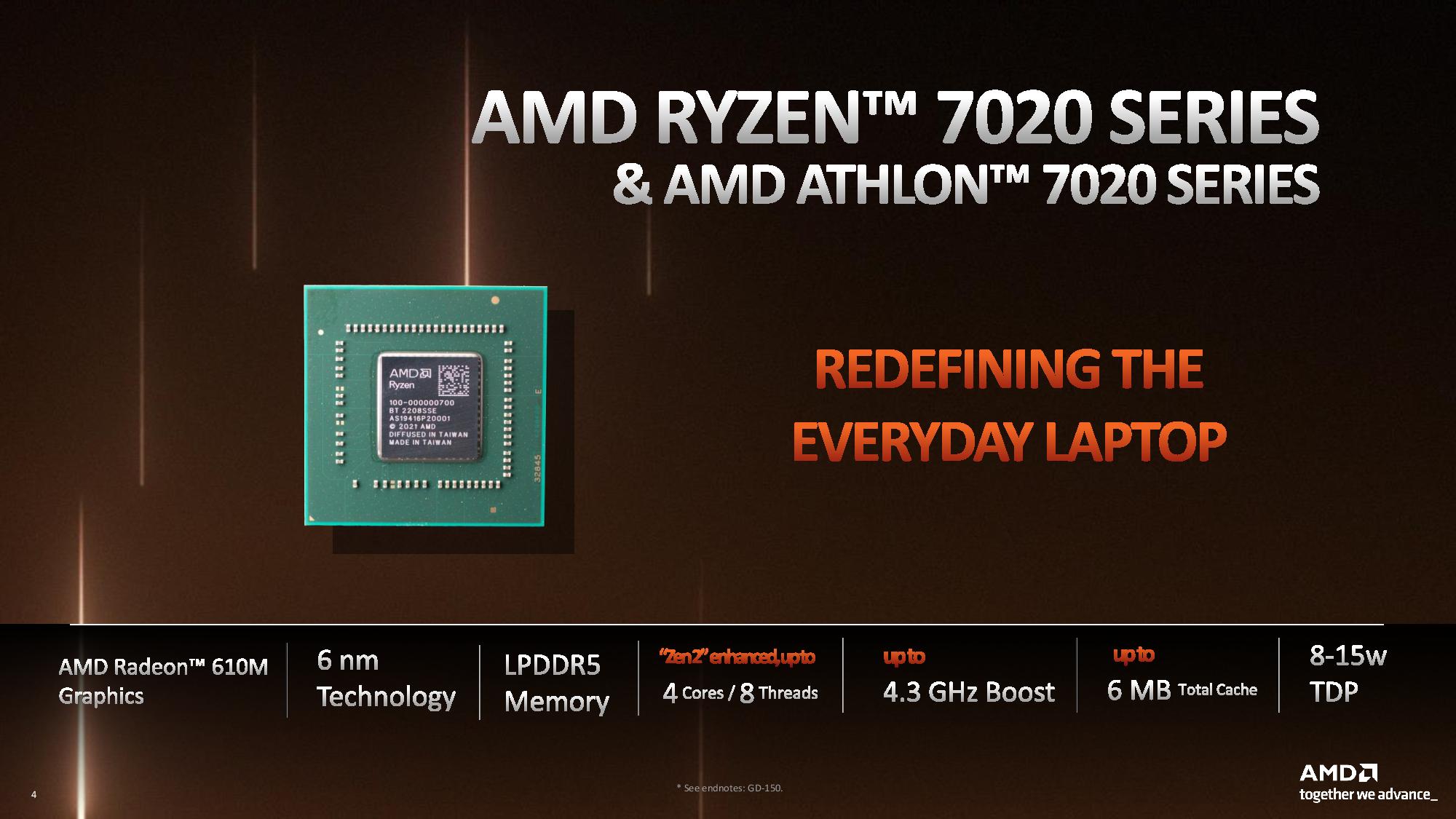AMD Details 7020 Series Ryzen and Athlon ‘Mendocino’ Mobile APUs
Aiming for the "Everyday Laptop"
Back at Computex, AMD announced its "Mendocino" APUs, meant to increase the company's presence in mid-to-low-end laptops. Today, the company has provided plenty more details of the chips, now dubbed the AMD 7020 series, which includes two Ryzen processors and an Athlon Gold chip. All will use AMD's Zen 2 architecture on a six-nanometer platform.
The first laptops with the new chips will be released in Q4 of this year.
The chips come with a slew of new features that AMD claims will boost performance on what it calls the "everyday laptop" — the type of notebook you go into a brick and mortar store to get on a tight budget, particularly when you're largely focused on web browsing. AMD is promising longer battery life and faster performance than the notebooks on the market today.
| Header Cell - Column 0 | Athlon Gold 7220U | Ryzen 3 7320U | Ryzen 5 7520U |
|---|---|---|---|
| Cores / Threads | 2 / 4 | 4 / 8 | 4 / 8 |
| Base Clock | 2.4 GHz | 2.4 GHz | 2.8 GHz |
| Boost Clock | 3.7 GHz | 4.1 GHz | 4.3 GHz |
| Cache | 5MB | 6MB | 6MB |
| TDP | 8 - 15 W | 8 - 15 W | 8 - 15 W |
| Graphics | Radeon 610M (integrated) | Radeon 610M (integrated) | Radeon 610M (integrated) |
The new chips, the Ryzen 3 7320U, Ryzen 5 7520U and Athlon Gold 7220U, will use the Zen 2 architecture with up to 4 cores and 8 threads, LPDDR5 memory and AMD Radeon 610M graphics based on RDNA 2.
AMD is estimating up to 12 hours of battery life on 7020 series systems, partially thanks to "Dedicated video and audio playback hardware for low-power optimization." That number is based on estimates using engineering samples with a video playback test. 12 hours on a budget notebook would indeed be impressive, and mean far less charging. Of course, only time and testing will tell how close reality comes to AMD’s estimations.


The company also claims the 7020 series will make budget notebooks boost faster, with support for ball grid array (BGA) NVMe SSDs. AMD compared the Ryzen 3 7320U to an Intel Core i3 1115G4, an 11th Gen "Tiger Lake" processor running on Intel's 10nm SuperFin process, which AMD claims is a strong representation of what you can find in "everyday laptops" in stores today. The company claims its Ryzen 3 is up to 31% faster in PCMark 10 productivity, up to 58% faster in Cinebench R23's multi-threaded test and up to 80% faster in 7-Zip. AMD also suggests that its chip allows for software to launch 31% faster, per the PCMark 10 "App Start" test. AMD tested its Ryzen 3 with 4GB of RAM and a 1TB SSD to the Intel chip with 8GB of RAM but a paltrier 256GB SSD.
That performance differential with 4GB of RAM is impressive, and AMD says the chips support LPDDR5. In this case, we don't know what kind of RAM the Intel laptop was using.
Get Tom's Hardware's best news and in-depth reviews, straight to your inbox.
The graphics on board the 7020 series chips are AMD's integrated Radeon 610M graphics. These use RDNA 2 tech and have AV1 decode support, and will allow for up to four displays to be powered at once. In fact, AMD claims you could use these graphics for gaming at 60 frames per setting at 720p.
AMD didn't list the exact settings for its testing, but in some footnotes, it said it tested on a reference board using the Athlon 7220U CPU, Radeon 610M, 4GB of RAM and a 1TB NVMe SSD. The company claims "League of Legends" ran at 84.34 fps, "CounterStrike: Go" ran at 97.28 fps and "DOTA 2" played at 61.23 fps. No further details on the Radeon 610M were provided.
The company is also touting that the 7020 series will feature a Bio USB channel, alongside support for Microsoft's Pluton processor for more security.
Earlier this month, AMD shook up the model numbers for its mobile Ryzen processors. It clarified there that the first digit, in this case a seven, stands for the model year of 2023. (Since these 7000 series chips are coming out in 2022, we must presume AMD is taking notes from car manufacturers). The other notable number is the third digit. That "two" is for Zen 2. Many will criticize AMD for using the 7000 series with an old architecture, but we've yet to see how AMD will market this in big box stores.
AMD says the first three laptops to include the 7020 series processors will be the Lenovo Ideapad 1, HP 17-inch Laptop PC and Acer Aspire 3. No pricing was given, but these devices should launch in Q4 2022. The company also showed an Asus logo, but didn't name a machine.
In the past few years, AMD has become a significantly more popular name in laptops, with more designs than ever. Will that translate to the low end, where older Intel (and some AMD) platforms have dominated? We'll find out later this year.

Andrew E. Freedman is a senior editor at Tom's Hardware focusing on laptops, desktops and gaming. He also keeps up with the latest news. A lover of all things gaming and tech, his previous work has shown up in Tom's Guide, Laptop Mag, Kotaku, PCMag and Complex, among others. Follow him on Threads @FreedmanAE and BlueSky @andrewfreedman.net. You can send him tips on Signal: andrewfreedman.01
-
shady28 So, applying their new naming scheme...Reply
These would be Zen 2 chips. Remember, the 3rd number is the one to pay attention to. -
cyrusfox Reply
Old is new again, and again...shady28 said:These would be Zen 2 chips. Remember, the 3rd number is the one to pay attention to. -
peachpuff Reply
Yup I knew that would happen, slimey amd.shady28 said:So, applying their new naming scheme...
These would be Zen 2 chips. Remember, the 3rd number is the one to pay attention to.
-
ravewulf You might want to double-check that table... it looks like the cores/threads row was copied from Excel interpreted as dates rather than the text valuesReply
"4-Feb 8-Apr 8-Apr"
Which I assume should be
"2/4 4/8 4/8" -
Wisecracker ReplyAll will use AMD's Zen 2 architecture on a six-nanometer platform ... is promising longer battery life and faster performance than the notebooks on the market today ... Radeon 610M graphics based on RDNA 2
""TSMC claims 18 percent higher logic density on 6nm versus 7nm ""
Nicely done __ Doc Su and team pulls another Rope-A-Dope on the competition.
And then, there is this . . .
Steam Deck Is Speeding Up Production And ShipmentsYou may be able to get your hands on a Steam Deck earlier than expected.
Valve has announced that it's ahead of schedule on Steam Deck production, speeding through reservations for the handheld PC gaming device. Per its most recent update, all reservations made for the Q3 period have had email invitations sent out, with the company now getting a head start on Q4. -
Giroro Replypeachpuff said:Yup I knew that would happen, slimey amd.
But of course AMD has already broken away from this chart, because these 8-15W low-end processors are being sold in the "U / 15-28W / Premium Ultrathin" Category. Shouldn't these processors by 7X20e, or something? -
Giroro Zen 2, yikes.Reply
I completely understand why AMD would want to continue manufacturing old CPUs for legacy support, but what I do not understand is why AMD would waste time/money porting an old architecture to a new manufacturing process. Why not at least port Zen 3 instead?
The best I can figure is that they have specialty customers who are demanding large enough numbers a slightly more efficient Zen2/RDNA 2 APU. So AMD is probably repurposing some development work from an APU for a "PS5 slim" or an "Xbox Series X Slim". Although TSMC 6nm isn't a big enough improvement over 7nm to make a much smaller console.. Maybe we will at least see a PS5 that is smaller than a human child. Alternatively Sony could be making an even bigger-er and more-overpriced-er PS5 Pro Plus Ultra. -
RedBear87 Reply
They did it, it's called Rembrandt (Ryzen 6000) and it's getting a refresh with Ryzen 7000 apparently. Rembrandt is Zen 3 on 6nm with RDNA2 graphics. The problem in the lower end is that Zen 3 is based on 8 cores CCX parts, which are unlikely to give enough defective parts that can be used for 2 or 4 cores cheap CPU/APU, in fact it's much easier to find a Zen 2 based 5300U (Lucienne) laptop than a Zen 3 based 5400U (Cezanne) one. Basically AMD has designed an architecture, Zen 3, that doesn't scale as well to the lower end as much as its previous architectures (or those of the concurrency), the same is true for Zen 4, thus they will need to recycle a lot of their old stuff.Giroro said:Why not at least port Zen 3 instead? -
cyrusfox Reply
Reusing a design on a smaller node isn't much of a recycle. With the resources(Cash) AMD has now, strange that they don't utilize them to retool/tweak the design to take advantage of the smaller node. When are we going to see AMD's small/efficient core strategy come to market(Google says Zen5)? Those smaller cores would be ideal for this application. I have a zen2 HP laptop, my only complaint is drivers and battery life thanks to poor drivers, thing never properly sleeps and other basic drivers are flakey (Web cam...).RedBear87 said:thus they will need to recycle a lot of their old stuff.
For the low end I would have thought making zen2 on old node would be more appropriate than retooling for smaller node as these are usually very low margin products. Guess it was better for cost (More serviceable die/$ thanks to better die size ). -
RedBear87 Reply
The jump from 7nm to 6nm doesn't seem to be particularly complex or expensive, on the GPU side they've also done it with low-end/low-margins RX 6500M/6500/6400. In the Ryzen 7000 series they're also going to recycle both Barcelo and Rembrandt, which are going to receive refreshes, maybe because of limited 5nm capacity in this case? I'm not sure, but both were mentioned in the slides published a few weeks ago.cyrusfox said:Reusing a design on a smaller node isn't much of a recycle.
